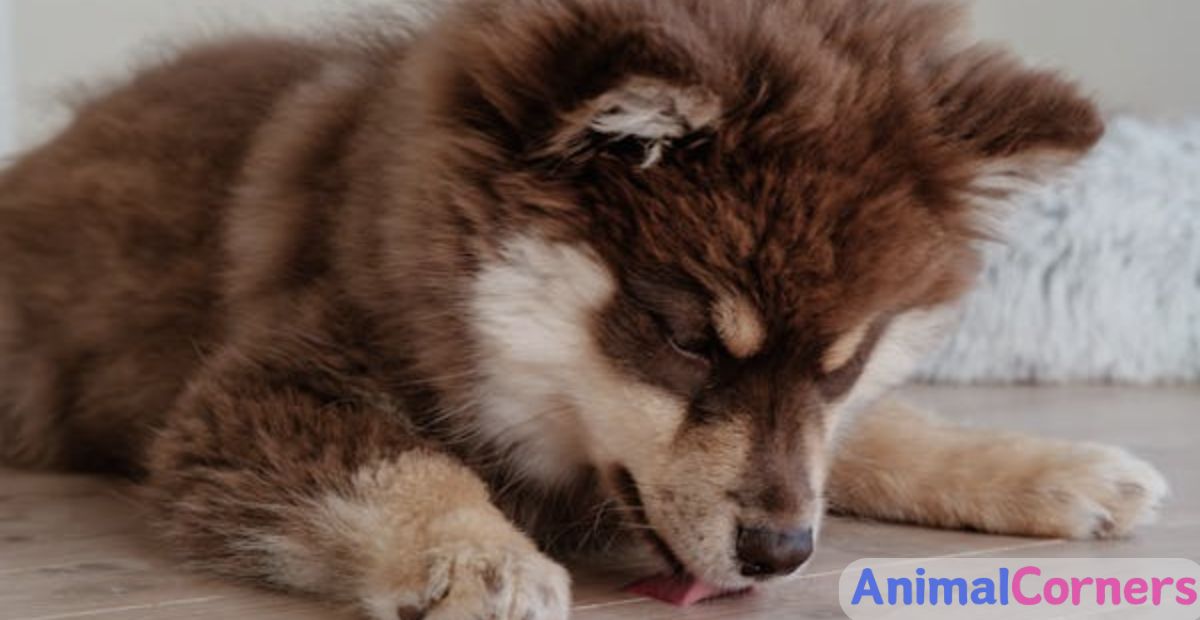Why is my dog licking the floor?

Dogs do a lot of things that make us marvel at why they do it. One thing they often do is lick the floor. You might see your hairy friend doing this and wonder why. At the point when canines lick the floor, it tends to be only something ordinary they do, yet some of the time it very well may be an indication that something’s going on. It’s normal for canines to lick surfaces, counting the floor, since they could like the taste or smell. But, if they’re doing it a lot, it might be a hint they’re bored, anxious, or even not feeling well. It’s one of those things that’s normal to a point but can also make us worry if it’s trendy too much.
In this post on AnimalsCorner, we’ll be taking a deeper dive into the interesting world of dog behaviors, exactly focusing on why dogs lick the floor. By exploring various reasons behind this behavior, from simple interest to potential health concerns, we aim to provide pet owners with a better sympathy for their canine friends.
Normal Behavior vs. Concerning Signs
Why can occasional floor licking be considered normal or playful behavior?
Occasionally, seeing your dog lick the floor is nobody to worry about. Sometimes, they’re just exploring their world. Dogs experience their surroundings largely through their sense of smell and taste. A released crumb or a stimulating smell on the floor might catch their care, leading to a few licks. This behavior can be seen as lively or just their way of examining something new.
Distinguishing between habitual behavior and signs that may indicate a need for concern
But, when this behavior turns from an infrequent interest into a regular habit, it’s time to take a closer look. Characteristic floor licking could be a sign that your dog is bored and trying to find something to do. It can also designate anxiety or stress, as repetitive behaviors can be a way for dogs to soothe themselves. More highly, if your dog is licking the floor extremely, it could be a sign of a health issue, such as a digestive problem or nutritional deficiency.
The key is to observe and understand the setting of your dog’s behavior. Normal, chance licking is typically nothing to worry about. But if you notice it’s becoming a frequent behavior, or if it’s attended by other signs of distress or illness, it might be time to consult with a vet.
Possible Reasons Behind Floor Licking

Seeking Food Residues
One of the most upfront reasons dogs lick the floor is to seek out food residues. Dogs have a very acute sense of smell, projected to be tens of thousands of times more sensitive than humans. This powerful sensual ability can detect the faintest odors, such as crumbs or spills from food items, which might not be visible or noticeable to human occupants. So, dogs are often attracted to specific spots on the floor where these scents are strongest, leading them to explore further with their tongues. While this behavior is generally harmless, guaranteeing your floors are clean can minimize it.
Boredom or Anxiety
Boredom or worry can also manifest through boring behaviors like floor licking. Dogs are integrally active and require regular physical and mental stimulation. Lack of appointment can lead to boredom, propelling them to find alternative sources of amusement or stress relief, which, in some cases, results in licking the floor. Nervousness, perhaps triggered by changes in the environment or routine, can likewise drive a dog to repetitive behaviors as a coping device. Speaking the root causes by increasing exercise, play, and mental challenges can help mitigate these behaviors.
Nausea or Upset Stomach
Floor licking can sometimes be indicative of stomach discomfort or upset in dogs. Nausea, indigestion, or other intestinal issues may prompt dogs to lick surfaces, including floors, as an instinctive behavior to ease their discomfort. This activity might be gone to by different indications of disease, for example, slobbering, heaving, or a diminishing in craving, and ought to be taken very. In the event that stomach issues are supposed, talking with a veterinarian for a sincere finding and treatment plan is urgent.
Nutritional Deficiencies
Finally, nourishing needs could drive canines to lick floors and different surfaces looking for missing minerals or supplements. This way of behaving, known as pica, can at times happen when a canine’s eating regimen comes up short on crucial nutrients or minerals. They may rashly search out elective sources to satisfy their healthful requirements, prompting licking non-food things. Confirming a balanced diet formulated to meet all their nutritional requirements is vital to prevent such lacks and associated behavioral issues.
See Also:-Why Is My Dog Losing Weight?
How to Respond to Your Dog’s Floor Licking?
Monitoring and Assessment
The first step in speaking your dog’s floor licking is thorough monitoring and assessment. Note the frequency, duration, and context in which this behavior occurs. Is it after meals? Does it happen in a specific room? Is it more frequent during times of stress or change in the household? By understanding the “when” and “why” behind the behavior, you can tailor your response more jobwise. It’s also crucial to observe if the licking is joined by other indications, such as vomiting, lack of appetite, or behavioral changes, which could designate fundamental health issues.
Environmental Enrichment
To combat boredom or anxiety that might be warning the licking, inspiring your dog’s environment is key. Introduce new toys and puzzles that task their mind and provide physical exercise. Scheduled playtimes, interactive games, and training sessions can also keep their mind engaged and reduce unwanted behaviors. Regular walks and outdoor activities offer both physical exertion and mental inspiration by revealing them to new sights, smells, and sounds, keeping their innate interest satisfied and stopping boredom-related behaviors.
Consulting a Vet
If after monitoring and environmental enrichment, the licking persists or if you observe any accompanying signs of distress or illness, consulting with a veterinarian is essential. Excessive licking could signal health issues that require professional analysis and treatment. Be ready to provide detailed comments about your dog’s behavior, diet, and overall health to assist in the assessment. In some cases, a referral to a veterinary behaviorist might be recommended to address obsessive-obsessive tendencies or worry disorders successfully.
By following these steps monitoring and valuation, providing environmental enrichment, and seeking professional advice when essential you can ensure a healthier, happier life for your canine companion, speaking not just the symptom of floor licking but the fundamental causes as well.
Conclusion
Understanding the reasons behind our dogs’ behaviors, such as floor licking, is important to confirming their health and happiness. These actions can be pointers of a range of issues, from boredom and anxiety to health concerns like stomach problems or nutritive deficiencies. Therefore, it’s commanding for dog owners to observe and respond to these behaviors thoughtfully. By doing so, we not only address the symptoms but also the root causes, attractive our dogs’ quality of life. We inspire all dog owners to stay attentive to their pets’ actions, as they often communicate much about their well-being through such behaviors.
FAQs
Can floor licking be completely stopped in dogs?
It’s possible to reduce or manage the behavior by addressing the original causes, such as boredom, nutritional lacks, or health issues. However, completely stopping the behavior may not be achievable in all cases, particularly if it’s linked to ingrained habits or anxiety. Consistent monitoring, environmental improvement, and professional guidance are key to managing this behavior successfully.
How can I tell if my dog’s floor licking is due to health issues or behavioral problems?
Detecting any supplementary symptoms can provide insights. Health-related floor licking often comes with other signs of distress, like vomiting, diarrhea, or lethargy. In contrast, social floor licking might be more habitual or occur in specific contexts, such as when your dog is left alone. Consulting a veterinarian can help separate between the two.
Is it necessary to consult a vet for occasional floor licking?
Chance floor licking can be normal dog behavior, particularly if it does not persist or is not attended by other about symptoms. However, if the behavior becomes frequent or obsessive, or if you notice any health changes in your dog, seeking veterinary advice is optional to rule out any original issues.
Can diet changes help stop my dog from licking the floor?
Indeed, in the event that the floor licking is driven by nutritious needs, changing to a reasonable, supplement rich eating routine can help. Continuously talk with a veterinarian prior to rolling out significant improvements to your canine’s eating routine to affirm the new eating routine meets their particular nutritious requirements.
Are certain dog breeds more prone to floor licking?
Some canine varieties might be more inclined to exhibitions that incorporate floor licking because of their high energy levels or propensity towards stress or fanatical impulsive inclinations. However, environmental factors, diet, and overall health play important roles in this behavior across all breeds.




